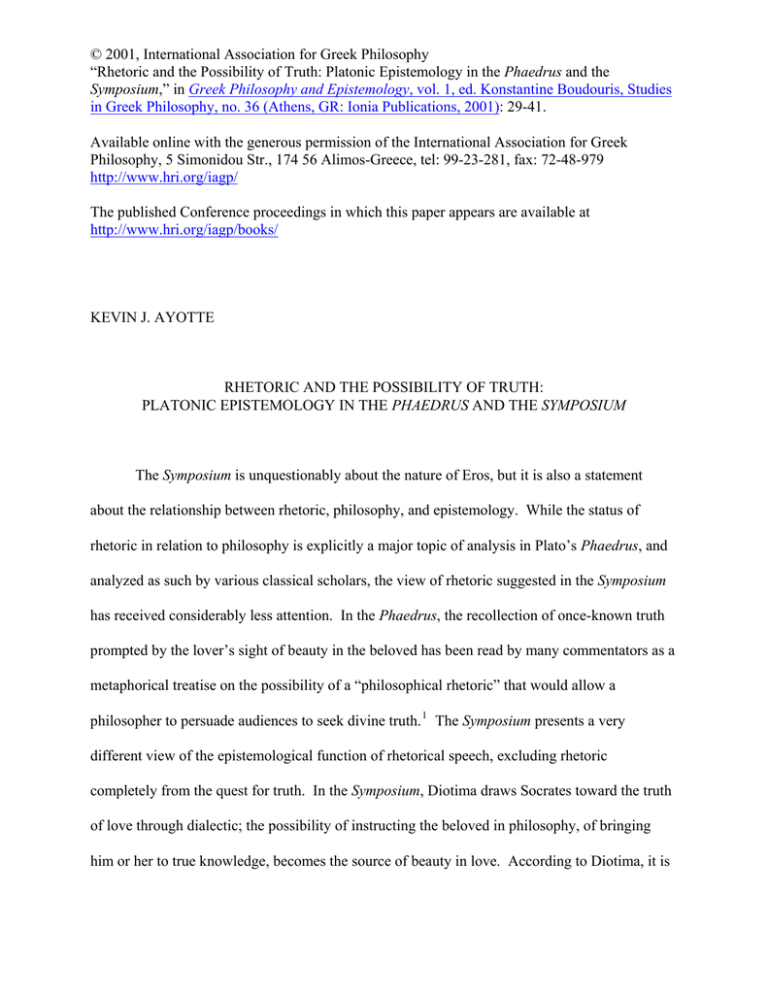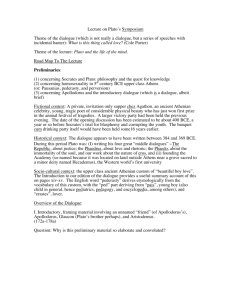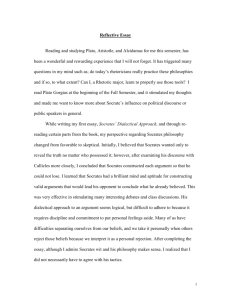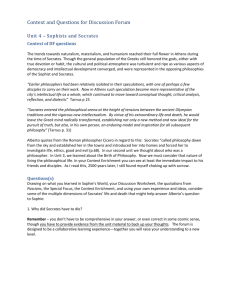© 2001, International Association for Greek Philosophy Phaedrus : 29-41.
advertisement

© 2001, International Association for Greek Philosophy “Rhetoric and the Possibility of Truth: Platonic Epistemology in the Phaedrus and the Symposium,” in Greek Philosophy and Epistemology, vol. 1, ed. Konstantine Boudouris, Studies in Greek Philosophy, no. 36 (Athens, GR: Ionia Publications, 2001): 29-41. Available online with the generous permission of the International Association for Greek Philosophy, 5 Simonidou Str., 174 56 Alimos-Greece, tel: 99-23-281, fax: 72-48-979 http://www.hri.org/iagp/ The published Conference proceedings in which this paper appears are available at http://www.hri.org/iagp/books/ KEVIN J. AYOTTE RHETORIC AND THE POSSIBILITY OF TRUTH: PLATONIC EPISTEMOLOGY IN THE PHAEDRUS AND THE SYMPOSIUM The Symposium is unquestionably about the nature of Eros, but it is also a statement about the relationship between rhetoric, philosophy, and epistemology. While the status of rhetoric in relation to philosophy is explicitly a major topic of analysis in Plato’s Phaedrus, and analyzed as such by various classical scholars, the view of rhetoric suggested in the Symposium has received considerably less attention. In the Phaedrus, the recollection of once-known truth prompted by the lover’s sight of beauty in the beloved has been read by many commentators as a metaphorical treatise on the possibility of a “philosophical rhetoric” that would allow a philosopher to persuade audiences to seek divine truth. 1 The Symposium presents a very different view of the epistemological function of rhetorical speech, excluding rhetoric completely from the quest for truth. In the Symposium, Diotima draws Socrates toward the truth of love through dialectic; the possibility of instructing the beloved in philosophy, of bringing him or her to true knowledge, becomes the source of beauty in love. According to Diotima, it is 2 participation in philosophy, via methexis, that makes love beautiful. Simultaneously, Socrates discounts the flattery of epideictic rhetoric as sufficient to produce such knowledge. This paper argues that the Symposium ultimately represents a denial of the epistemic potential of rhetorical persuasion. Following the conclusion of the first five speeches by the other party guests, Socrates announces: “[Agathon’s] speech reminded me so strongly of that master of rhetoric, Gorgias”(198b-c). 2 This reference to Gorgias is not accidental, and should remind us of Socrates’ description of rhetoric in the dialogue bearing that Sophist’s name: “rhetoric apparently is a creator of a conviction that is persuasive but not instructive about right and wrong”(455a). 3 In the Symposium, Socrates follows this same line of thought and criticizes all five eulogies for their rhetorical character, that is, their lack of dialectically-secured truth. Specifically, he observes that “the truth, it seems, is the last thing the successful eulogist cares about; on the contrary, what he does is simply to run through all the attributes of power and virtue, however irrelevant they may be, and the whole thing may be a pack of lies, for all it seems to matter”(198d-e). Diotima reinforces this distinction between opinion and philosophical knowledge, introducing her lesson to Socrates with a brief discussion of “true belief.” Socrates agrees with her claim that “holding an opinion which is in fact correct, without being able to give a reason for it, is neither true knowledge ... nor ignorance”(202a). From the beginning of Socrates’ speech, it is clear that one of the goals of this Platonic work is an interrogation of the epistemological status of rhetoric. If the truth about love is not reached in any of the other guests’ eulogies, what then is its nature? In his speech about Eros Socrates recounts a lesson he learned from Diotima. According to it Love is a mystical medium, one of the spirits “that ply between heaven and earth, 3 flying upward with our worship and our prayers, and descending with the heavenly answers and commandments.... [I]t is only through the mediation of the spirit world that man can have any intercourse ... with the gods”(202e-203a). The allegorical purpose of this mythologized intermediary becomes clearer as Diotima identifies the kind of “worship” and “answers” in which this particular winged spirit traffics. She notes that “wisdom is concerned with the loveliest of things, and Love is the love of what is lovely. And so it follows that Love is a lover of wisdom”(204b). Here, Diotima’s claim that love is a yearning for what one lacks becomes important, for the lover of wisdom does not possess wisdom; only the gods do. Love seeks wisdom, but can only come to possess it by continually recreating it in the body and mind of another. According to Diotima, “Love is not exactly a longing for the beautiful, ... but for the conception and generation that the beautiful effects.... [W]hy all this longing for propagation? Because this is the one deathless and eternal element in our mortality.... [W]hich is to say that Love is a longing for immortality”(206e-207a). Biologically, the only way in which humans can outlast their mortality is through bodily procreation, through their children. Spiritually, human knowledge can approach immortality only to the extent that it propagates itself in the mind of a student: the lover’s beloved. As F. C. White notes, “at every stage of her discourse, Diotima states in one form or another that the object of love is the good, embodied in forms of excellence which acquire quasi-permanence – in the memories of others or in physical shrines and memorials – or genuine permanence through the attainment of godlike immortality.” 4 In the superiority of spiritual procreation we begin to see Plato’s emphasis on the relationship between philosopher and student as lover and beloved. It is immediately clear that the spiritual mediation by the daimon Love allegorically describes the intellectual elevation encouraged by the philosopher in his or her student; Diotima’s instruction of Socrates offers a concrete example. 4 Diotima concludes that the propagation of the spirit is to be preferred over propagation of the body because the philosopher lover “and his friend will help each other rear the issue of their friendship – and so the bond between them will be more binding, and their communion even more complete, than that which comes of bringing children up, because they have created something lovelier and less mortal than human seed”(209c). The role of Eros as a daimon connecting human and divine realms then metaphorically frames the entirety of Socrates’ vision of the student-teacher relationship. In the words of Kenneth Dorter, “in this concept of the ‘daimonic’ (202d13), the metaphor exhibits the basis of the possibility of metaphysical philosophy.” 5 Having drawn the reader’s attention to the pedagogical relationship between the lover and beloved, Plato is then able to use the discussion between Socrates and Diotima to illustrate the epistemological function of dialectic. Diotima’s description of the beloved student’s ascent up the “ladder” of beauty all the way to true knowledge traces the successive understanding of ever more transcendental levels of love arrived at through philosophical, that is dialectical, exchange. Within this process of philosophical education, rhetoric has no place. Beautiful discourse becomes an effect of dialectical reasoning, not a persuasive or motivating force. Diotima declares that “[f]irst of all, if his preceptor instructs him as he should, he will fall in love with the beauty of one individual body, so that his passion may give life to noble discourse”(210a). After considering how the bodily beauty of one individual is actually related to the physical beauty of all individuals (210a-b), Diotima explains that “[n]ext he must grasp that the beauties of the body are as nothing to the beauties of the soul, so that wherever he meets with spiritual loveliness ... he will find it beautiful enough ... to quicken in his heart a longing for such discourse as tends toward the building of a noble nature”(210b-c). For the beloved, it is his 5 participation in the philosophical reflection on love that creates the longing for virtuous discourse, or philosophy, not some rhetorical persuasion toward that end. Diotima continues her narrative, stating that the philosopher’s pupil will then move on to contemplate the beauty of laws and institutions (210c) and then the sciences, “so that he may know the beauty of every kind of knowledge”(210c-d). The fact that both the method and the goal of this process consist of dialectic is confirmed as Diotima describes the approach to true knowledge of love. She states that, “turning his eyes toward the open sea of beauty, he will find in such contemplation the seed of the most fruitful discourse and the loftiest thought, and reap a golden harvest of philosophy, until ... he will come upon one single form of knowledge”(210d). Finally, like a dawning revelation, the student achieves true knowledge, rather than merely “correct opinion,” having rigorously pursued via the practice of philosophy the reasons underlying that truth. Diotima announces that “now ... there bursts upon him that wondrous vision which is the very soul of the beauty he has toiled so long for”(210e). Although the manner by which the student ascends the ladder of beauty is described throughout Diotima’s narrative in the language of contemplative philosophy, it is not until the end of her dialogue with Socrates that the import of the earlier criticism of the guests’ epideictic flattery becomes apparent. The entire Symposium is, among many other things, a vehement condemnation of the practice of rhetoric. At the end of Diotima’s lesson, the seeress concludes that “it is only when he discerns beauty itself through what makes it visible that a man will be quickened with the true, and not the seeming, virtue – for it is virtue’s self that quickens him, not virtue’s semblance. And when he has brought forth and reared this perfect virtue, he shall be called the friend of god, and if ever it is given to man to put on immortality, it shall be given to him”(212a). Read in the context of the other speeches presented at Agathon’s party, and particularly against the backdrop of the 6 Phaedrus, this statement amounts to a resounding denial of the notion that rhetoric crafted to persuade a human audience to seek truth holds any place within Plato’s epistemology. First, and this does not become obvious until the end of Diotima’s discourse, the audience addressed by the first five speeches differs considerably from that addressed by Socrates. Phaedrus, Pausanias, Eryximachus, Aristophanes, and Agathon are all speaking to the human audience present, attempting to outdo one another’s rhetoric in an effort to produce the most artful praise of Eros. While this may seem a banal observation regarding the audience for innocuous after-dinner speeches, it may be helpful to recall Socrates’ statement in the Phaedrus that “the wise man should exert not for the sake of speaking to and dealing with his fellow men, but that he may be able to speak what is pleasing to the gods”(273e). 6 We know from both the Phaedrus (247c-d) and the Symposium (202c; 205a) that it is reason, wisdom, and the good that please the gods, not any sort of rhetorical flattery. In the Symposium, it is only Socrates, with his reliance on the methodical dialectic of his conversation with Diotima, who engages in the kind of philosophical discourse judged to be pleasing to the gods. Although we could reach such a conclusion from Socrates’ derisive comparison of the other speakers’ Gorgian flattery to his knowledge about the “facts” (198d) of love, it is ultimately Diotima’s scorn of “virtue’s semblance” that confirms it. Persuasive rhetoric, in this instance epideictic flattery, could not hope to achieve more than a mere semblance of truth because the discernment of “beauty itself” comes only from “what makes it visible,” that is participation in the philosophical quest for it. And only that philosophical discernment of beauty itself is pleasing to the gods. Second, the rhetorical nature of the first five speeches is characterized by Socrates, almost tautologically, as indicative of rhetoric’s lack of epistemological promise. Socrates decries the absence of truth in the five eulogies, saying “I take it then that what we undertook 7 was to flatter, rather than to praise, the god of love, and that’s why you’re all prepared to say the first thing about him that comes into your heads, and to claim that he either is, or is the cause of, everything that is loveliest and best” (198e). Stated here before Socrates’ speech, perhaps more clearly than anywhere else in the Symposium, their rhetoric lacks the epistemological potential for producing true knowledge simply because the first five discourses are untrue. John Moore is more generous in his commentary, suggesting that “[t]he first five speakers all contribute something which will figure in the final definition of Eros, but essentially they represent the fumbling involved in the collection stage of the dialectical process.” 7 Moore is correct in his observation that elements of all five speeches find their way into the eventual Socratic truth of love, but perhaps too generous in labeling the efforts of the first speakers “dialectical.” Even if those speeches contain grains of truth, they represent the sort of “correct opinion” reached accidentally in the telling of amusing stories rather than “true belief” achieved through philosophical examination. Beyond the rather facile claim that none of the first five speeches hold true knowledge “just because Socrates says so,” the fact that they are rhetorical in nature – broadly intended to persuade a human audience of their aesthetic virtue – merits further consideration of the place of persuasion within Platonic epistemology. Knowledge, for Plato, is characterized by certainty and based upon reasons. According to Edwin Black, “Plato looked upon knowledge, the object of instruction, as accompanied by an unshakable certitude which conviction, the object of persuasion, lacked. This deficiency of certitude was not affected by the truth-value of the conviction.” 8 Diotima’s statements regarding “correct opinion” make clear that truth without the certainty of reason is no knowledge at all. Even if an audience were persuaded to believe correctly one of the elements of the ladder of beauty, including the reasons for that belief, such a 8 belief would fall short of knowledge because it would circumvent the dialectical process through which one comes to understand the ultimate Form of beauty. As J. Moravcsik argues, “the initial comprehension of the more specific types of beauty cannot be ‘knowledge,’ in the strict Platonic sense; since it does not involve the grasping of a Form, it must be provisional understanding, to be made complete and adequate only when the different kinds of beauty are seen in the light of their relation to the Form of Beauty. To see the types in this manner is the aim of dialectic.” 9 Again, by definition in Plato’s view, rhetoric can have no epistemic function because belief from persuasion does not provide an understanding of the Form of Beauty achieved by the dialectical examination of reasons underlying that belief. Finally, it is the lack of participation in this process of philosophical dialectic that ultimately denies rhetoric an epistemological role in the Platonic quest for truth. Running throughout Diotima’s lesson is the notion that the source of beauty in love is philosophical instruction itself, the possibility of instructing one’s beloved in the practice of philosophy. Diotima has explained that propagation “is how the body and all else that is temporal partakes of the eternal”(208b). The highest form of that procreation is identified as spiritual in nature, and the specific example used to illustrate this concept is the philosopher’s guidance onto the ladder of beauty. For the student-beloved, it is participation in that dialectic through which he or she comes to understand the reasons for the different aspects of beauty, and so achieves true knowledge of “beauty itself” and consequently true virtue. As Robert Mitchell writes, “it is only in this openness – only in the love that philosophy is, and not in the beautiful and splendid words and thoughts that it produces – that deathlessness is to be found. Diotima’s last word is that this one, above all men, is loved by the gods and is deathless.” 10 While absolutely necessary for the student-beloved’s ascension to knowledge of the Forms, participation in philosophical dialectic 9 is also portrayed as mandatory for the philosopher-lover. It is the propagation of knowledge, via methexis, that makes the loving relationship virtuously beautiful; this is how the philosopher can achieve spiritual procreation and approach immortality. As Daniel Anderson explains, “what one ‘participates in’ is a process, ... [a]nd the nearest that a mortal can approach to immortality is by participating in that process.” 11 If we are to consider the implications of the Symposium for the relationship between rhetoric and philosophy, it becomes apparent that Diotima’s concluding remarks, indeed the entire drinking party, represent an almost unrelenting dismissal of the notion of epistemic rhetoric. While not approaching the defamation of Eros we saw in Socrates’ first speech in the Phaedrus dialogue, the rhetoric of the first five speeches in the Symposium falls far short of the detached philosophical instruction that can ensure the orator’s immortality. The praise of Eros throughout the Symposium illustrates Plato’s view of the relationship between rhetoric and philosophy, but what are we to do with Alcibiades’ speech, holding the significant position of the final oratory yet praising Socrates instead of Eros? Mitchell claims that Alcibiades’ speech is “the culmination of the entire effort and struggle of the Symposium.” 12 This statement is no mere hyperbole, although for reasons somewhat different than those later articulated by Mitchell, as Alcibiades’ praise of Socrates seems to illustrate everything this dialogue represents about Plato’s view of the relationship between rhetoric and philosophy. Given the context of a discussion about the truth of love, we should take seriously Alcibiades’ demand that Socrates interrupt his speech if he speaks untruly (214e). The point is not merely that Alcibiades’ statements regarding the character of his relationship with Socrates can be read as adequate representations of their respective behaviors. More importantly, the truth in Alcibiades’ discourse lies in its exemplification of the problematic nature of a “philosophical rhetoric.” As Dorter observes, “Alcibiades … shows how what Socrates had called divine and 10 had presented religiously can be seen in human (philosophical) terms.” 13 The issue then is to consider what Alcibiades’ account of his failed romantic pursuit of Socrates demonstrates in terms of Platonic epistemology. Alcibiades describes the effect Socrates’ discussion of philosophy has on his soul. He declares that Socrates’ words inspire in him the kind of hunger for philosophic contemplation that he believes is the goal of the philosopher’s project. Alcibiades states that “I’ve been bitten in the heart, or the mind, or whatever you like to call it, by Socrates’ philosophy, which clings like an adder to any young and gifted mind it can get hold of”(218a). Alcibiades thinks that his fascination with Socrates’ words is sufficient to constitute an actualization of Socrates’ philosophical pursuits, as if by remaining the passive recipient of the rhetorical force of a serpentine philosophy he could somehow attain wisdom. Mitchell takes Alcibiades’ words literally, arguing that “[w]hat has bitten us is speech in the love of wisdom…. The pain that results makes us wild, whipping us into a philosophic drunken frenzy.” 14 According to this reading, it would seem that merely hearing the words of the great philosopher is sufficient to inspire the divine madness necessary for the contemplation of truth. Alcibiades’ initial inspiration by Socrates, and his subsequent failure to seduce him into a physical relationship, lead Mitchell to conclude that Alcibiades is compelled to contemplate philosophy: “Alcibiades began with the intention of gaining possession of the images within Socrates. He ended with a shattering apprehension of the images within – himself.” 15 The problem here is that Mitchell’s reading fails to account for Socrates’ and Diotima’s portrayal of the chaste relationship between lover and beloved as philosophical teacher and student. What Alcibiades demonstrates in his speech is not Socrates’ success in inspiring beautiful youths to pursue philosophy, but rather the failure of rhetorical persuasion to achieve those very ends. As Anderson observes, Alcibiades’ 11 “real motive is not learning … but seduction.” 16 The opening discussion of “correct opinion” in Diotima’s lesson is of paramount importance here, as is her lesson about the need for mutual participation from the lover and beloved in the dialectical study of the truth about love. Yet it is clear from Alcibiades’ speech that he is not learning knowledge in the sense of “true belief.” Alcibiades admits feeling shame whenever he sees Socrates because he realizes he always fails to practice what he hears Socrates teaching: “then next time I meet him I remember all that I had to admit the time before, and naturally I feel ashamed”(216b-c). This is not a case of simple difficulty in grasping complex philosophical ideas; rather it is an illustration of the way in which some audiences might only be persuaded to correct opinions regarding elements of Socratic truth. Alcibiades does not understand the reasons behind Socrates’ truth because he is not actually participating in the kind of educational relationship for which both Socrates and Diotima have been calling. For example, Socrates condemns the indulgence of the lover’s physical desires with the beloved (Phaedrus 250e; 255e-256b), yet Alcibiades pursues Socrates on a superficially physical level, as if by possessing the philosopher erotically Alcibiades could gain access to his wisdom. If we take Diotima’s lesson seriously, Alcibiades remains trapped in the pursuit of only the semblance of beauty, and consequently the semblance of truth, because he never reaches an understanding of the need for the chaste relationship between philosopher-lover and student-beloved in the dialectical contemplation of truth itself. Even the wrangling over seating arrangements at the beginning of the party serves to illustrate this point, as when Socrates says to Agathon, “I only wish that wisdom were the kind of thing one could share by sitting next to someone – if it flowed, for instance, from the one that was full to the one that was empty”(175d, emphasis in original). Physical proximity, and by extension Alcibiades’ desire to consummate his love for 12 Socrates, falls far short of the engaged philosophical reflection necessary to achieve true wisdom. Socrates’ love for Alcibiades provides an example consistent with Diotima’s lesson: Socrates recognizes Beauty in Alcibiades, not merely superficial physical attractiveness. As Victoria Wohl writes, “Socrates loves Alcibiades not for his money, charm or good looks, but as a manifestation of Absolute Beauty. Socrates’ chaste, philosophical passion legitimates Alcibiades as a love object.” 17 Socrates meets the prerequisite for pedagogical love through his suppression of lust, but Alcibiades’ physical interests preclude his participation in virtuous philosophical education. Alcibiades’ relentless pursuit of sex with Socrates demonstrates again by negative example what love (in Socrates’ view), and consequently philosophical knowledge, is not. As Dorter notes, “[i]f he were able to keep his Bacchic passion focused on the god and virtue he perceives in Socrates, rather than constantly confusing it with the appetitive and egocentric gratification of sexual conquest, that passion would eventually lead to transcendence.” 18 For Plato’s purposes, Alcibiades represents a failure of philosophical instruction, and better, an example of the failure of any quest for true knowledge that does not include participation in a chastely pedagogical and dialectical examination of truth. The culmination of the Symposium with Alcibiades’ speech, then, synthesizes the dialogue’s argument about the relationship between philosophy and rhetoric in Platonic epistemology. Alcibiades’ failure to grasp Socrates’ message on the nature of love, and his inability to practice the Socratic teachings in philosophy, ultimately demonstrate the futility of a “philosophical rhetoric” that attempts to persuade audiences to seek truth. According to Anderson, “what Alkibiades is fleeing is philosophy, the dialectic.” 19 Socrates offers instruction in philosophy, but Alcibiades’ failure to achieve wisdom despite his initial frenzied inspiration by Socrates’ words affirms Diotima’s lesson that participation in the disinterested meditation on 13 metaphysical Beauty is the only path to truth. Contrary to Mitchell’s assertion that this is a “philosophic drunken frenzy”[emphasis added], there is nothing philosophical about Alcibiades; he never participates in the dialectical education that might allow him to transcend his own mortality. Alcibiades’ comparison of Socrates’ words to the enchanting effect of the satyr Marsyas’ pipes underscores Plato’s concern with the abuses of rhetorical persuasion. Alcibiades declares: “Socrates … can get just the same effect without any instrument at all…. [W]hen we listen to you, or to someone else repeating what you’ve said, even if he puts it ever so badly, … we’re absolutely staggered and bewitched…. [T]he moment I hear him speak I am smitten with a kind of sacred rage”(215c-d). Although Alcibiades perceives something akin to the divine madness that Socrates sees as indicative of philosophical meditation, the other elements in this passage provide evidence that what Alcibiades is describing represents only a caricature of philosophy – e.g., rhetoric. In contrast to Diotima’s already articulated lesson, that participation in philosophical dialectic is essential for attaining true knowledge, Alcibiades believes that the words of the philosopher are enough. Yet the discourse alone, whether spoken by Socrates or anyone else, constitutes mere rhetoric for Plato. Alcibiades’ soul is moved by the rhetorical force of Socrates’ words, but the absence of the dialectical education reduces them to the simple persuasion of correct opinion. Alcibiades’ additional claim that those words are “bewitching” points more to the danger of rhetorical sorcery than to an understanding of the need to participate in the quest for what those words describe. The comparison of Socrates to Marsyas illustrates Plato’s perception of the threat rhetoric posed to the future of Athens, whose succor he thought lay in philosophy. The notion of a “philosophical rhetoric” in Platonic epistemology does not escape this condemnation, as 14 Alcibiades demonstrates. Alcibiades essentially describes such a “philosophical rhetoric” with his belief that Socrates seduces (i.e., persuades) his audiences to seek truth; yet, as William Kelley writes “what greater insult could he hurl, even in jest, than to compare him to the master of sensual love and seduction, the satyr? … [R]hetoric understood as seduction is fakery of the worst sort and is analogous to love of the basest kind…. The seducer foists appearances on the unwary; as Phaedrus says about the shams of the would-be orator.” 20 As Kelley suggests, it is only in the framework of the tension between rhetoric and philosophy that the significance of Alcibiades’ failed attempts to seduce Socrates becomes clear. Alcibiades’ futile pursuit of Socrates exemplifies the audience persuaded by rhetoric, perhaps achieving correct opinions about some aspect of love, perhaps enthralled into following the philosopher, but always falling short of true knowledge because of the failure to participate in philosophy itself. Alcibiades’ praise of Socrates’ words is true to the extent that he describes their rhetorical effects upon himself and others, but most especially true because of what Alcibiades’ speech illustrates about Plato’s view of the dangers of rhetoric. Alcibiades attempts to seduce Socrates because he thinks he knows the value of those “images” inside Socrates; yet his refusal to actually participate in the dialectical inquiry that is Socratic philosophy ultimately results in the frustration of Alcibiades’ goal. As Kelley explains, for Plato “[r]hetoric is the semblance of wisdom as seduction is the semblance of love.” 21 In the end, Plato’s Symposium represents a concerted attack on the epistemological aspirations of persuasive rhetoric. In Diotima and Socrates’ words, as well as in the structure of the entire discourse of the drinking party, Plato demonstrates again and again that his epistemological schema leaves no room for the logical inadequacies of figurative speech. Participation in the practice and instruction of philosophy alone offer the hope of achieving 15 virtue and thereby transcending human weakness to reach toward the divine. Having considered the many ways through which Plato constructs this argument for philosophy in the Symposium, it is illustrative to turn one last time to the dialogue of the Phaedrus, which specifically examines the status of persuasive rhetoric, in thinking of Plato’s view of the relationship between rhetoric and philosophy. Echoing the entirety of Diotima’s discourse on love, Socrates states near the end of the Phaedrus that “[t]he dialectician selects a soul of the right type, and in it he plants and sows his words founded on knowledge, words which can defend both themselves and him who planted them, words which instead of remaining barren contain a seed whence new words grow up in new characters, whereby the seed is vouchsafed immortality, and its possessor the fullest measure of blessedness that man can attain unto”(276e-277a). The argument by some classical scholars that Plato’s view of rhetoric became more accommodating in the Phaedrus after the harsh condemnation in the Gorgias seems increasingly insufficient in the light of the epistemological schema outlined in the Phaedrus and the Symposium. The notion that a “true rhetoric” might enable a philosopher to persuade audiences to seek truth is denied by the pedagogical relationship between the philosopher and student described in the Symposium. Consistent throughout the two dialogues is the explicit dismissal of the epistemic potential of rhetorical persuasion and the valorization of the dialectical method of philosophical instruction. Socrates regards speech as aesthetically beautiful provided that it is pleasing to the gods; yet only the dialectical discourse of philosophers seeking wisdom merits divine regard in Plato’s dialogues. Plato’s epistemological project is ultimately inextricable from his desire to rescue Athens from what he perceived as the rhetorical depredations of the Sophists. The notion of a “philosophical rhetoric” finds little purchase within an epistemology that demands dialectical education as the only path to true knowledge. 16 NOTES 1 See for example Richard Weaver, The Ethics of Rhetoric (Chicago: Henry Regnery Company, 1953), p. 21; G. R. F. Ferrari, Listening to the Cicadas: A Study of Plato’s Phaedrus (Cambridge: Cambridge University Press, 1987), p. 38; James S. Murray, “Disputation, Deception, and Dialectic: Plato on the True Rhetoric (Phaedrus 261-266),” Philosophy and Rhetoric 21, no. 4 (1988), pp. 282-284; Eric Ramsey, “A Hybrid Technê of the Soul?: Thoughts on the Relation between Philosophy and Rhetoric in Gorgias and Phaedrus,” Rhetoric Review 17, no. 2 (1999), p. 257. 2 Symposium, trans. Michael Joyce, in The Complete Dialogues of Plato, eds. Edith Hamilton and Huntington Cairns (Princeton, NJ: Princeton University Press, 1978). All citations from the Symposium refer to this edition. 3 Gorgias, trans. W. D. Woodhead, in The Complete Dialogues of Plato, eds. Edith Hamilton and Huntington Cairns (Princeton, NJ: Princeton University Press, 1978). 4 F. C. White, “Love and Beauty in Plato’s Symposium,” Journal of Hellenic Studies 109 (1989), p. 153. 5 Kenneth Dorter, “The Significance of the Speeches in Plato’s Symposium,” Philosophy and Rhetoric 2, no. 4 (1969), p. 228. 6 Phaedrus, trans. R. Hackforth, in The Complete Dialogues of Plato, eds. Edith Hamilton and Huntington Cairns (Princeton, NJ: Princeton University Press, 1978). All citations from the Phaedrus refer to this edition. 7 John D. Moore, “The Relation Between Plato’s Symposium and Phaedrus,” in Patterns in Plato’s Thought, ed. J. M. E. Moravcsik (Boston, Mass: D. Reidel Publishing, 1973), p. 60. For example, Phaedrus states that the lover, by virtue of his inspiration, is nearer to the gods than the beloved(180a-b). Pausanias claims that actions, including loving, done with noble intent will be good(181a). Eryximachus emphasizes the need to distinguish between chaste, noble love and that motivated by bodily pleasure(187e). Aristophanes declares that it is our duty to inspire our friends(193a-b). Agathon indicates that Love is the “author” of virtue in those around him(197c). 8 Edwin Black, “Plato’s View of Rhetoric,” Quarterly Journal of Speech 44, no. 4 (1958), p. 372. 9 J. M. E. Moravcsik, “Reason and Eros in the ‘Ascent’-Passage of the Symposium,” in Essays in 17 Ancient Greek Philosophy, eds. John P. Anton and George L. Kustas (Albany: State University of New York Press, 1972), pp. 295-6. 10 Robert Lloyd Mitchell, The Hymn to Eros: A Reading of Plato’s Symposium (Lanham, MD: University Press of America, 1993), p. 168. Emphasis in original. 11 Daniel E. Anderson, The Masks of Dionysos: A Commentary on Plato’s Symposium (Albany: State University of New York Press, 1993), p. 78. 12 Mitchell, p. 184. 13 Dorter, “Significance,” p. 233. 14 Mitchell, p. 194. 15 Mitchell, p. 199. 16 Anderson, p. 118. 17 Victoria Wohl, “The Eros of Aclibiades,” Classical Antiquity 18, no. 2 (1999), p. 376. 18 Kenneth Dorter, “Three Disappearing Ladders in Plato,” Philosophy and Rhetoric 29, no. 3 (1996), p. 295. 19 Anderson, p. 115. 20 William G. Kelley, “Rhetoric as Seduction,” Philosophy and Rhetoric 6, no. 2 (1973), pp. 72- 73. 21 Kelley, p. 79. KEVIN J. AYOTTE DEPARTMENT OF COMMUNICATION UNIVERSITY OF PITTSBURGH




